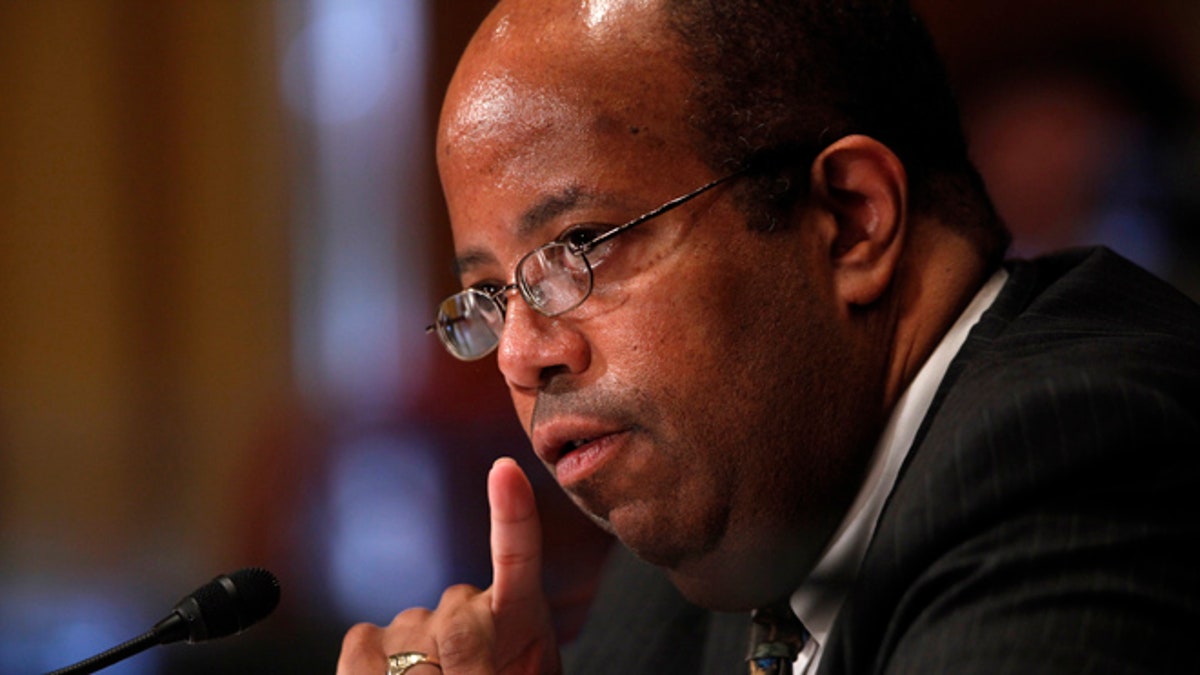
May 21, 2013: J. Russell George, Treasury Inspector General for Tax Administration, testifies on Capitol Hill. (AP)
Not even the man who investigated the IRS over its Tea Party targeting is being spared from the scrutiny of Congress.
In an unusual twist to the Capitol Hill probes into the tax agency, lawmakers have started to challenge the government watchdog who uncovered the wrongdoing -- questioning why he kept the findings from Congress at the height of an election year. They claimed Inspector General J. Russell George had an obligation under the law to do so, but ignored that.
George, who until now was portrayed as the impartial official who blew the whistle on the IRS, was grilled by Republican Rep. Darrell Issa at Wednesday's House hearing for keeping the details from Congress for the better part of a year.
"That, in fact, is perhaps the greatest failing of an otherwise well-regarded inspector," Issa said.
The chairman of the House Oversight and Government Committee recited and released an intriguing set of emails that show his staff voicing frustration as they tried to pry details about the IRS probe from the inspector general.
One request in September 2012 asked for an update, saying they were told it would be ready by then.
"Field work for this audit is still ongoing," the IG's office replied.
Issa's staff again asked for an update in December, after the election had passed. They were told they could provide a "substantive briefing" by March. Staff checked again in February, and were told the IG's office was "leaving no stone unturned" -- and that, as a result, there would be no briefing until late April or early May.
"Frankly, it is disappointing and frustrating that it is taking this long," Issa's staff replied. The staff asked again in April, and then in May, to no avail.
After the scandal was made public, Issa's office shot a note to the inspector general's staff calling the situation "unacceptable." The IG office explained that the IRS had gone ahead and admitted to the practice without telling anybody beforehand.
"Despite numerous requests from the committee for information and updates ... that requested for the IG to inform Congress about serious or flagrant problems quickly, the IG failed to do that," Issa said Wednesday.
Issa cited the federal Inspector General Act in claiming George should have come forward.
The relevant section of that law states that the inspector general should report "immediately to the head of the establishment involved" whenever he or she learns of "particularly serious or flagrant problems, abuses, or deficiencies." The agency head is then supposed to "transmit" the information to the appropriate congressional committees "within seven calendar days."
Issa, who earlier complained in an Aug. 3 letter to George that the rule was being used "sparingly," says this is effectively a requirement for IGs to report problems to Congress via agency heads.
Issa suggested Wednesday that George did not follow that course since agency heads claimed they were not fully aware.
The inspector general, though, disputed Issa's charge, claiming the probe was not complete at the time.
"To ensure fairness and to ensure that we are completely accurate with the information that we convey to Congress, we will not report information until the IRS has had an opportunity to take a look at it to ensure that we're not misstating facts," he said.
"That is not the statute. That is not the statute," Issa shot back.
George claimed it would have been "impractical" to share incomplete information with Congress at the time.
He added: "As you, I'm sure, are aware, many times when information is conveyed to the Hill, it is sometimes not retained (on) the Hill ."
Rep. Jim Jordan, R-Ohio, though, echoed Issa's concerns.
"We'd have liked to (have) known that information. All we knew from you is, OK, we're doing an audit," he told George.
The inspector general is not a President Obama appointee. George was nominated as Treasury Inspector General for Tax Administration by former President George W. Bush, and was confirmed in November 2004.





















